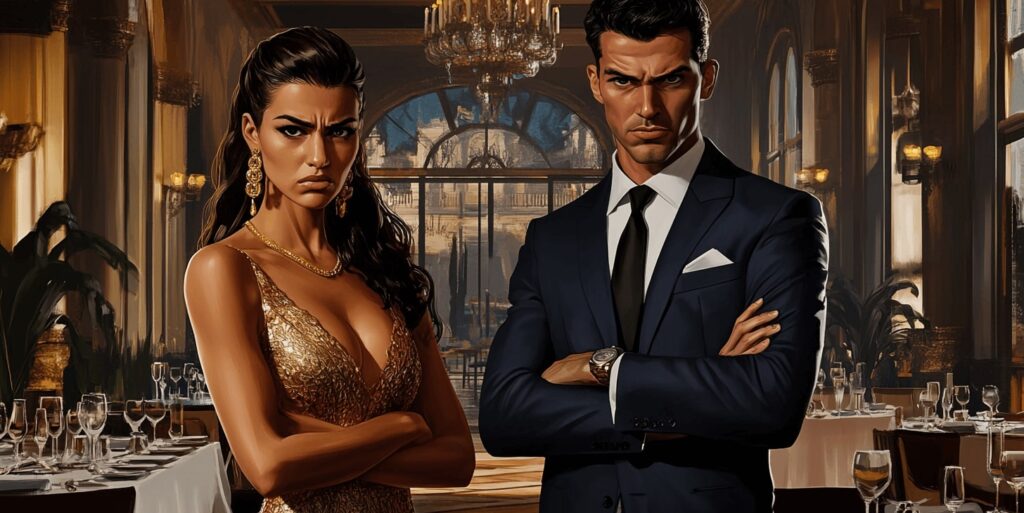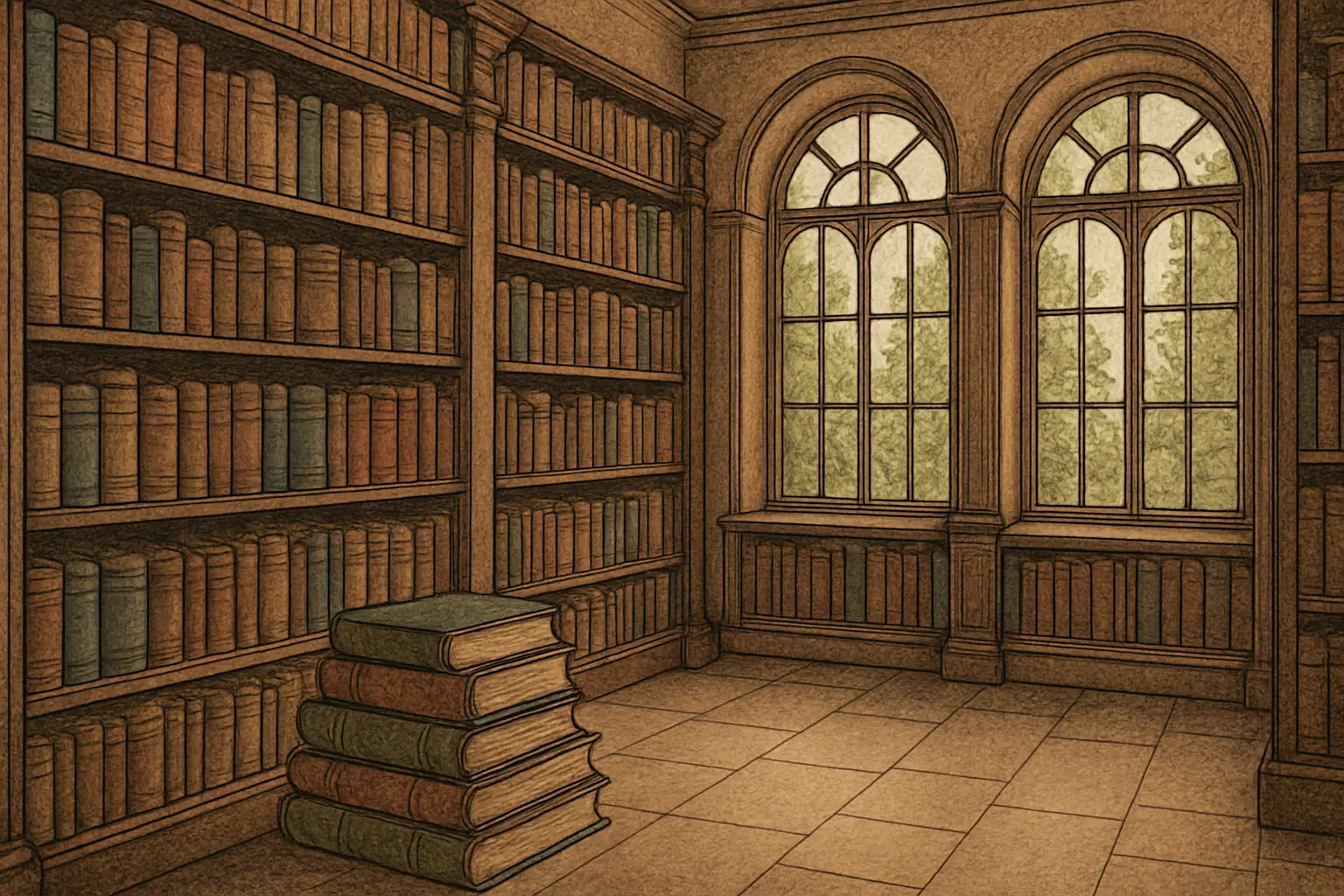Table of Contents
ToggleWhat is the Arranged Marriage Trope?
The arranged marriage trope in romance books is when two characters brought together in marriage by someone else: their families or due to circumstances beyond their control.
They usually start as strangers, acquaintances, or even rivals. The story is about how they handle this unexpected situation, slowly getting to know each other. Over time, they overcome misunderstandings and eventually fall in love. This trope mixes tension, surprise, and the hope that love can bloom in unexpected places.
Variations of Arranged Marriages in Books (With Galatea Examples)

The Arranged Marriage trope has 7 main variations. Let’s list them.
-
Traditional Arranged Marriage
Families or the community arrange the marriage, with little input from the couple. It’s common in historical romances or cultures where arranged marriages are the norm. The story focuses on the couple learning to love each other despite not choosing each other. In Savage by Kristen Mullings, the main character’s best friend marries the love of her life in an arranged marriage set up by her mother.
-
Marriage of Convenience
Characters marry for practical reasons like money, status, or benefits—not love. Over time, this business-like arrangement turns into real affection and love. In Mason by Zainab Sambo, the main character Lauren agrees to marry the exacting billionaire because he needs a wife to protect his business interests.
-
Forced Marriage
Characters are pushed into marriage due to external pressures like family debts, inheritance rules, or avoiding scandal. The tension comes from being in an unwanted marriage and dealing with the unexpected feelings that develop. In The Arrangement by S.S. Sahoo, Angela Carson is forced to marry billionaire Xavier Knight to help pay for her father’s mounting medical bills.
-
Fake Marriage
Characters pretend to be married to gain some advantage, like claiming an inheritance or avoiding danger. The fun begins as they try to keep up the act, only to realize they’re developing real feelings for each other. In The Billionaire’s Baby by Kimi L. Davis, the main character agress to marry a billionaire and have his heir in exchange for a hefty payday.
-
Enemies to Lovers through Arranged Marriage
Here, the characters start off as rivals or even enemies, but an arranged marriage forces them to be together. The story is full of sparks and drama as they go from hating each other to falling in love. The Arrangement also falls into this category as well, as Xavier and Angela hate each other for much of the first book and only fall for each other later.
-
Cultural or Political Arranged Marriage
This often involves royalty or diplomats where marriage secures alliances, peace, or power. The couple must navigate their relationship and the cultural or political pressures around them. In The Alpha’s Arrangement by Monika S. Senderek, the lead agrees to marry the alpha of a faraway pack in order to protect her pack’s alliances.
-
Modern Arranged Marriage
In contemporary settings, characters may agree to marry due to cultural traditions or family expectations, but more voluntarily. The tension arises from balancing modern values with traditional expectations.
Forced Marriage Trope

In romance novels, the Forced Marriage trope is when characters are pushed into marriage against their will. This could happen because of threats, blackmail, or family pressures. Unlike arranged marriages, where there’s usually some consent, forced marriages involve no choice at all. The story often explores how the characters deal with this tough situation and how they eventually find love despite the circumstances.
Arranged Marriage Vs Forced Marriage (Yes, There is a Difference)
In romance novels, arranged marriages usually have some level of agreement, focusing on duty and gradually falling in love. Forced marriages, though, involve pressure or threats, making the journey to romance much more intense and challenging.
Let’s explore the differences further.
Aspect |
Arranged Marriage |
Forced Marriage |
| Consent | In an arranged marriage, the characters typically have some level of consent, even if it’s reluctant. The marriage is often set up by families, communities, or cultural expectations. But the individuals involved usually agree to it, even if they’re not thrilled about the situation. | In a forced marriage, one or both characters don’t have much of a choice. They’re pushed into the marriage because of things like threats, blackmail, or tough situations. This lack of choice makes the story feel darker and more intense. |
| Motivation | In an arranged marriage, the characters get married for practical reasons like family connections, cultural traditions, or social standing. They know they’re doing it out of duty. As they spend time together, they start to understand each other and eventually fall in love. | In a forced marriage, the characters are stuck getting married because of things they can’t control. Those could be having a debt, avoiding a scandal, or protecting someone they care about. This situation often makes them feel trapped or bitter, which adds a lot of tension to the story. |
| Tone | The feel of the story can vary a lot. It might be fun and light or more serious, depending on how the characters deal with things. The main issues usually come from misunderstandings, cultural differences, or just figuring each other out. | Forced marriage stories usually have a more intense and dramatic feel. The characters often deal with strong emotions like anger, or betrayal. The path to love becomes rather rocky. |
| Development | In arranged marriages, romance usually takes its time. The characters get closer and start to fall in love as they spend more time together and really get to know each other. | Romance usually grows as the characters tackle big challenges like mistrust, resentment, or danger. They have to get through these tough times before they can truly find love and understanding. |
Conflict and Tension
The Arranged Marriage trope is a perfect recipe for drama and emotional tension (which we love).
This makes any romance story exciting.
When two people are pushed into a marriage they didn’t choose, there’s bound to be friction – and there’s no good book without that. They might come from different worlds, have clashing personalities, or just not be ready for marriage, which creates an immediate spark of tension.
Unlike couples who fall in love and then decide to marry, these characters have to figure out their feelings while already being committed.
To read a story where the arranged marriage leads to plenty of interpersonal tension, check out Billionaire CEO on Galatea.
Character Development

In the Arranged Marriage trope, being stuck together forces strong character growth. When two people suddenly have to share their lives without really knowing each other, they’re pushed out of their comfort zones. Since they’re around each other all the time, they can’t hide who they really are. This helps them grow and change.
They can’t just walk away when things get tough. Instead, they have to talk, compromise, and truly understand each other. This process often reveals hidden parts of their personalities—like fears, past hurts, or dreams they didn’t even know they had.
As they spend more time together, they start to see beyond their first impressions. They begin to let down their guard, which allows them to connect in unexpected ways. This journey not only strengthens their relationship but also helps each character learn more about themselves. By the end, both characters have usually grown a lot, making their love story even more meaningful.
The Appeal – Why Arranged Marriage Books Are So Popular
Readers love seeing characters go from strangers—or even enemies—to lovers. It makes the story more exciting and emotionally rewarding. Watching two people who start off distant, cautious, or even hostile slowly break down their walls is really satisfying. Seeing them fall in love is like watching a puzzle come together, piece by piece.
This journey keeps readers hooked. The tension and unexpected moments make it hard to put the book down.
In Conclusion
It’s easier to understand this trope, when we define the main aspects. There could be more, but if we are talking about the most important ones – there are 5.
- Family Setup: Families or communities usually play a big role in arranging the marriage, often for reasons like traditions or social connections.
- Initial Tension: The characters often start with some tension because they might not know each other well or have different expectations.
- Slow-Burning Romance: Romance grows slowly as they spend time together and get to know each other, leading to a deeper connection over time.
- Cultural and Social Pressure: The story often involves cultural or social expectations that affect how the characters handle their relationship.
- Character Development: As they work through their arranged marriage, the characters usually grow and discover more about themselves and each other.
In the end, the Arranged Marriage trope in romance books is all about family drama, personal growth, and romance that builds slowly. It mixes tension, cultural expectations, and deep character development to keep readers engaged. Watching characters go from strangers to lovers in these setups shows that love can bloom in the most surprising ways.




